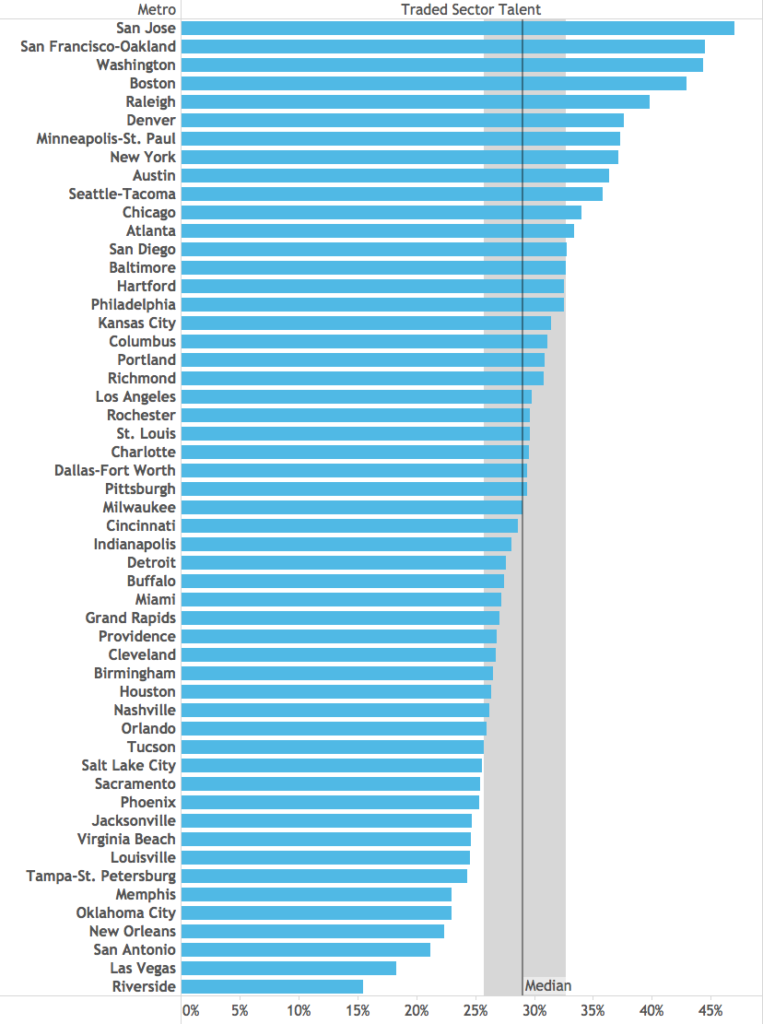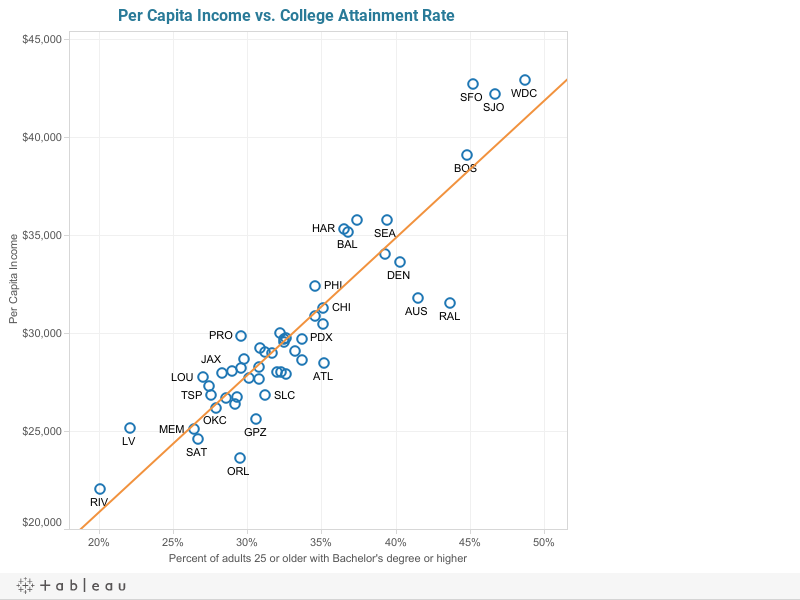Thumbnail: The consolidation campaign has adopted a jobs theme, but government structure has nothing to do with economic success. The two facts that determine economic success are talent and livability, and Memphis and Shelby County lacks the consensus program to improve educational attainment and to create a livable community.
**
Consolidation advocates charged out of the gate with a Jobs Now theme which sounded good in groupthink meetings but confronts the cold reality of day once it’s pushed out into the real world.
That’s because there’s no research that conclusively proves that consolidation is an engine for economic growth. In fact, the consensus is that consolidation has no effect at all, not to mention that the public is not naïve enough to accept the argument that economic prosperity is simply about a different government structure.
And yet, this is the argument that advocates have so far made, despite factual stumbles already from supporters and confusion about the ingredients that result in positive economic development.
After all, the factors that matter most for economic development – talent and livability – are unaffected by the structure of government and are long overdue for a real actionable plan to improve both factors.
Getting The Facts Right
As for the stumbles, the campaign may need a permanent fact-checker. A City Councilman said consolidation appealed to him because of what he’s seen in Nashville and Birmingham. Fact: Birmingham isn’t consolidated.
An official with Greater Memphis Chamber said that schools won’t be part of consolidation this time and that gives a campaign a greater potential for success. A Shelby County Commissioner agreed. Fact: schools were not a factor in the last charter vote 11 years ago. Schools were untouched. That charter kept Memphis City Schools and the old Shelby County Schools (which managed schools outside Memphis) in place. In other words, county voters sent the charter down in flames although it protected the school districts.
An official with the Jobs Now consolidation push, at a press event campaign, made the obligatory comparison to Nashville. He said: “When you look at Nashville, Nashville is growing at a faster rate than we are. There’s a strong possibility that Nashville’s GDP will be greater than Atlanta and Charlotte in years to come. In order for us to keep pace, I think we need to move in a different direction.” Fact: Nashville’s boom took place about 45 years after consolidation was passed and there is no clear nexus between the structure of government there and its GDP growth. Also, Atlanta’s GDP is more than three times greater than Nashville’s.
All in all, campaign advocates need to go light with the hyperbole and stick to fact-based arguments. They already are facing a skeptical public which is looking for arguments that make sense and are backed by data rather than overblown syllogisms suggesting our community will boom and all it takes is to copy Nashville’s metro form of government.
All told, the campaign would be wise to swear off the Nashville comparisons and explain how a consolidated government could actually change our community’s trajectory for the better.
Facts, Not Happy Talk
Here’s the challenge for consolidation advocates: they can’t make their strongest case for change for fear of turning off people they want as supporters.
For example, the economic indicators that matter show that Memphis and Shelby County – and the Memphis region, for that matter – are performing worse than comparable communities. However, the Chamber and other economic development officials are loathe to speak the unvarnished truth and advocates are at risk of adopting the happy talk that regularly passes here for economic analysis.
Second, arguably, the strongest case that advocates could make for consolidation is that it would attract new, bold, and innovative leadership to a new, exciting government. For example, Memphis has not had a great mayor in its modern history – it has had some highly competent ones – but cities that we admire most have had the kind of leaders who can inspire, captivate, and mobilize a city to do great and unexpected things and see old problems with new eyes.
The consolidation campaign’s hands are tied to make this argument because it’s plugged into an existing power structure and doesn’t want to say anything that sounds like criticism of current elected officials. It’s a line of argument that just might have more traction with the public.
No One Else Will Save Us
Back to jobs: in expressing his support for a charter commission, Commissioner Milton said: “We need jobs. Bottom line, we need more jobs, and the only way I know to do that is to bring more jobs down here to Memphis.”
Commissioner Milton is generally smart about the issues that matter, so perhaps he misspoke, but the only way to get more jobs is not to bring them – recruit them – here. After all, some of our biggest employers were created by Memphians, so an obvious question is what programs are in place to encourage small and mid-sized businesses to get even bigger and what can be done to give them their best opportunities to expand.
This has been the secret of success for many cities, and one of the problems here has been that we are stuck in old ways of – smokestack chasing, in the old terminology – and that we keep thinking someone is coming to rescue us.
Here’s the thing: I’m willing to bet that none of the 70 active prospects that the Chamber says it has in its pipeline of prospects have asked it about the structure of local government here. Said one more time: government structure is irrelevant to economic success.
What matters most are talent and livability – opposite sides of the same coin.
Needed: New Thinking
Next year will be the 20th anniversary of the Memphis report commissioned by Shelby County Government that put talent on the front burner as an issue here. There’s still no shared plan of action to retain, train, and attract the talent that our economy needs to succeed and improve.
There was a burst of interest in retaining and attracting talent, and even some new programs were created, notably by Leadership Memphis, but over time, attention dissipated and these days, there little emphasis now on the issue.
That report 19 years ago said it well and it’s still relevant for Memphis and Shelby County:
In the old economy, people believed that:
- Being a cheap place to do business was key
- Attracting companies was the key
- A high-quality physical environment was a luxury that stood in the way of attracting cost-conscious businesses
- Regions won because they held a fixed competitive advantage in some resource or skill
- Economic development was government-led
In the new economy, people believe:
-
Being a place rich in ideas and talent is the key
-
Attracting educated people is a key
-
Physical and cultural amenities are key in attracting knowledge workers
-
Regions prosper if organizations and individuals have the ability to learn and adapt
-
Only bold partnerships among business, government, and nonprofit sector can bring about change
It’s Talent, Stupid
And, despite the hyperbole to the contrary, we are not attracting young, college-educated workers that are the keys to economic success. In the ranking of the 50 largest metros, Memphis has sunk to #48 for the percentage of the population with a college degree – and this single data point accounts for 60 percent of a city’s economic success – and it has not substantially changed for at least 20 years.
Contrary to old economic developing thinking, people do not follow jobs. It’s the other way around – jobs follow people. And those people decide where to live before they decide where to work. And what motivates these workers most are livable cities that are livable – vibrant public spaces, a resilient economy, sustainable mobility, accessibility, walkability, and robust neighborhoods.
If you’re looking for a reason that Nashville turned into a boom city, it’s because it became a magnet for talent, and jobs then followed them there. And talent moved to Nashville – and other boom cities – because it had a “hot” reputation as a result of its livability.
One of the things that made it livable was that unlike Memphis, its public services are not underfunded. Because of its higher property values, Nashville had had more to spent on quality public projects – from an NFL stadium to libraries to parks and more. Then, too private and philanthropic leadership invested in anchor assets that rebranded the city and created the amenities that became a magnet for talent.
It’s Also Educational Attainment, Stupid
Memphis urban expert Carol Coletta and Portland economist Joe Cortright pioneered the research and analysis about talent and its crucial role in a city’s economic success.
Their research, which has been applied in many cities to develop talent programs, proved that two factors drive economic success – talent and livability – and the question now becomes how consolidation can improve our performance with both. Truth be told, there’s nothing that has prevented Memphis from assembling a campaign about talent and livability for many years.
Meanwhile, because there is no argument that human capital is the key to economic success, it is unfortunate that schools aren’t treated by many as the talent incubators that they are, so another question is whether consolidation will result in more funding for teachers’ salaries and students.
“The single most important factor driving urban economic success is the educational attainment of a city’s population,” Mr. Cortright said. “If you want high incomes, you need to have a high level of skills. Statistically, educational attainment summarized by the fraction of the population of the population with a four-year college degree explains roughly 60% of the variation in per capita incomes among large U.S. metropolitan areas. No other single factor comes close. Cities with poorly educated populations will find it difficult to raise living standards in a world where productivity and pay depend increasingly on knowledge.”
Put simply, our economic success hinges on improving educational attainment. “In the aggregate, cities in which the number of bachelor’s degree holders grew had higher employment growth and lower unemployment rates,” Mr. Cortright said.
All Boats Rise
 To repeat, in the ranking of 50 largest MSAs in the percentage of population with bachelor’s degree, the Memphis region ranks #48. In addition, to determine where the most educated Americans are putting their degrees to work, WalletHub compared the largest MSAs across 11 metrics. Memphis ranked #106.
To repeat, in the ranking of 50 largest MSAs in the percentage of population with bachelor’s degree, the Memphis region ranks #48. In addition, to determine where the most educated Americans are putting their degrees to work, WalletHub compared the largest MSAs across 11 metrics. Memphis ranked #106.
Even more relevant for Memphis: studies of earnings show the average earnings for less skilled workers are higher in cities with higher overall levels of educational attainment.
There’s a national competition under way. Cities are fighting for talent and Memphis is not one of the winners in this battle. However, Memphis has a larger percentage of the population under 18 than its peer cities (Memphis has about 17,000 more than Nashville), so our opportunity is to develop our own talent by creating a countywide sustained movement to move students from their secondary school classrooms to college graduation.
All this said, there was nothing that prevented our community from making any of this happen, proving once more: it’s not about the structure of government; it’s about leadership.
Memphis and Shelby County are overdue for a serious priority-setting discussion about jobs and the kind of new thinking about economic development that creates them, starting with talent and livability and starting with the principle that progress rests with us.
It’s difficult to imagine this could happen in the midst of a consolidation campaign with its sales pitches because it would be hard to have the kind of hard-hitting, open, and honest discussions that are needed for a countywide consensus and plan. In a perfect world, this discussion would happen before anyone started a campaign for metro government.
In fact, such a discussion might uncover ways to achieve these goals without an emotional, divisive campaign about the future of local government.
**
Join us at the Smart City Memphis Facebook page for daily articles, reports, and commentaries that are relevant to Memphis.



